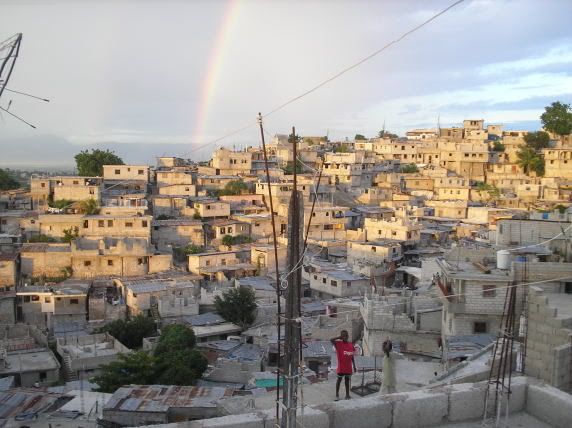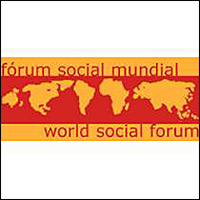Saturday, December 23, 2006
MINUSTAH Assaults Cite Soleil
Saturday, December 9, 2006
Interview tomorrow on Dyalog Popile
Monday, November 27, 2006
Haiti: Large Anti-Coup Demonstration in Cité Soleil.
Below is an excerpt of writings and photos by Wadner Pierre to be published on PopDem. A huge protest took place on Friday November 17, 2006, one day before the celebration of the 203rd anniversary of the Battle of “Vertieres,” the battle which freed Haiti from slavery on November 18, 1803. The inhabitants of the largest popular district of the capital (Cité Soleil) organized and demonstrated to show their dissatisfaction with regard to the foreign soldiers on their territory under the the UN banner.

They demanded the departure of the UN troops, the release of all political prisoners, the rehabilitation of all employees illegally dismissed by the de facto Latortue/Boniface regime and the physical return of President Aristide to Haiti.

Although no satisfaction for these demands has been reached in spite of continued demonstrations, a participant answered, "We will stop when our claims are heard by the authorities in place." The participant continued, saying that MINUSTAH must leave the country. "We do not need it, we, in Cité Soleil, we cannot live with the daily shootings of these soldiers, may the whole country unite in one voice to ask for the unconditional departure of MINUSTAH."
Sunday, November 26, 2006
Invisible Violence: Ignoring murder in post-coup Haiti
FAIRNESS & ACCURACY IN REPORTING
In an eight-minute report (6/5/05) in which she rode in a U.N. armored personnel carrier and extolled the bravery of U.N. soldiers, NPR correspondent Lourdes Garcia-Navarro cited “human rights organizations” as saying that “things have improved since the Aristide days.” The NPR report interviewed two members of the U.N. force, one U.S. police trainer, one Haitian police official and Gérard Latortue, the head of Haiti’s unelected interim government. It neglected to quote any victims of the violence perpetrated by the Latortue regime or any human rights organizations critical of the governmental-sponsored violence—perhaps because they might have pointed out that such violence actually increased dramatically during Latortue’s time in power.
After Haiti’s democratically elected leader, President Jean-Bertrand Aristide, was ousted in February 2004, the United States, Canada and France put into place an interim government made up of members of the opposition. Latortue, a wealthy Haitian-American, was installed as the head of this government.
On April 30, 2004, the United Nations, under U.N. Resolution 1542, established the U.N. Stabilization Mission to Haiti, known as MINUSTAH, grouping more than 9,000 military and police personnel from more than 40 countries under the leadership of Brazil and Canada. For more than 26 months, the interim government used former members of Haiti’s disbanded military, along with U.N.-trained paramilitary police, to crack down on the slum-dwelling supporters of the ousted government and of Fanmi Lavalas, the political party which had voted Aristide into office. During this period, the mainstream U.S. press observed a virtual blackout on the state-sponsored violence perpetrated by the U.S.-backed interim Haitian government.
Aristide under fire
For more than two-and-a-half years prior to the 2004 coup, paramilitary rebels led by former Haitian police chief Guy Philippe had attacked Haiti from bases in the Dominican Republic. They killed civilians and government officials, targeted police stations, Haiti’s largest dam and even the presidential palace, all sparking further violence. Government aid embargoes by both the Clinton and Bush administrations further stripped bare the foreign aid–dependent Haitian state.
Opposition-aligned political parties and anti-government “civil society” organizations, however, received tens of millions of dollars in training and support funds during that time from U.S., Canadian and European aid agencies, such as the U.S. Agency for International Development, the National Endowment for Democracy and the Canadian International Development Agency. With the Haitian currency, the gourde, plunging in value, poverty-stricken Haitians struggled under mounting prices and political destabilization.
Even under these conditions, the Aristide government continued to invest in education, medical training and a program to fight human trafficking, albeit with a yearly budget of approximately $300 million for a population of about 8 million. Daring to resist IMF calls to privatize its public industries while raising the minimum wage for Haitian garment industry workers and bringing suit against France for $21 billion in colonial reparations, the Aristide government accumulated powerful enemies.
Further political polarization resulted in violence, doggedly covered by the mainstream U.S. press throughout Aristide’s second administration (2/01–2/04). One of Aristide’s most widely publicized North American critics counted approximately 212 politically motivated deaths during Aristide’s second government, attributing 50 of those killings to the opposition (Michael Deibert, Notes From the Last Testament).
Murderous operations
By contrast, a National Lawyers Guild investigation documented that “800 bodies” had been “dumped and buried” by the morgue in Port-au-Prince in just the first week following the coup; the usual number under Aristide was less than 100 a month (3/29–4/5/04). The University of Miami Human Rights Investigation, a 10-day survey (11/11–21/04) during the interim government, discovered piles of corpses in Haiti’s capital of Port-au-Prince—victims of state security and paramilitary forces (Boston Globe, 4/19/05). World Bank official Carolyn Antsey told this reporter that “thousands died” as a result of the February 2004 events.
Alternative press agencies, human rights organizations and independent investigations, including Amnesty International, the New York University School of Law, L’Agence Haïtienne de Presse (AHP) and Dr. Paul Farmer’s Partners in Health, reported a concerted wave of interim government violence and persecution, while much of the U.S. mainstream press remained virtually silent.
Throughout 2004 and 2005, reports from the non-profit alternative news service Haiti Information Project (HIP) uncovered killings of Lavalas supporters carried out by members of the interim government’s Haitian National Police (HNP). HIP (7/05) also documented murderous operations, with victims often shot in the head, committed by the Brazilian and Jordanian contingents of MINUSTAH. The University of Miami Human Rights Investigation, conducted by Boston immigration lawyer Thomas Griffin in mid-November 2004, documented mass murder by the HNP, mass graves, cramped prisons, no-medicine hospitals, corpse-strewn streets and maggot-infested morgues—the interim regime’s means of dealing with the supporters of the ousted Aristide government. Nine months after Aristide was removed, Griffin wrote,
U.S. officials blame the crisis on armed gangs in the poor neighborhoods, not the official abuses and atrocities, nor the unconstitutional ouster of the elected president. Their support for the interim government is not surprising, as top officials, including the minister of justice, worked for U.S. government projects that undermined their elected predecessors. . . . U.N. police and soldiers, unable to speak the language of most Haitians. . . resort to heavy-handed incursions into the poorest neighborhoods that force intermittent peace at the expense of innocent residents. The injured prefer to die at home untreated rather than risk arrest at the hospital. Those who do reach the hospital soak in puddles of their own blood, ignored by doctors.
A few mainstream outlets occasionally reported on individual incidents of violence perpetrated by the interim government. The Miami Herald (3/1/05) reported: “Haitian police opened fire on peaceful protesters Monday, killing two, wounding others and scattering an estimated 2,000 people marching through the capital [on February 28] to mark the first anniversary of President Jean-Bertrand Aristide’s ouster. . . . Peacekeepers, whose orders are to support the police, stood by as the attack occurred. The police quickly disappeared, leaving the bodies on the street.”
On March 24, 2005, the Associated Press wrote: “Police opened fire Thursday during a street march in Haiti’s capital to demand the return of ousted President Jean-Bertrand Aristide. Witnesses said at least one person was killed. . . . Associated Press reporters saw police firing into the air and toward protesters.” Another AP dispatch (4/27/05) reported, “Police fired on protesters demanding the release of detainees loyal to Haiti’s ousted president Wednesday, killing at least five demonstrators.” On June 5, 2005, Reuters wrote, “As many as 25 people were killed in police raids on Friday and Saturday in the slums of Haiti’s capital.”
In one of the most graphic accounts to find its way into the mainstream press, the Miami Herald wrote (9/1/05):
The police carried assault rifles and wore black masks. The gang they accompanied had brand-new machetes. According to witnesses and U.N. investigators, they stormed into a soccer match during halftime, ordered everyone to lie on the ground and began shooting and hacking people to death in broad daylight as several thousand spectators fled for their lives. . . . Some were handcuffed and shot in the head by police, witnesses said. Others were hacked to death.
Missing the story
But such forthright reporting was exceptional, particularly in the most prominent news outlets. Studying the last two years of coverage by three leading mainstream U.S. newspapers—the New York Times, Los Angeles Times and USA Today—along with National Public Radio, Extra! found that 98.6 percent of the pieces related to Haiti ignored the role of state-sponsored violence and persecution. The few that did mention them provided a few isolated examples, usually working to discredit the documented incidents as partisan political allegations. The human rights reports citing a high number of political prisoners and killings by the interim government’s HNP were rarely cited by the mainstream press.
Following the 2004 coup, press accounts based on interviews with interim government, MINUSTAH and U.S. government officials ensured that an official version of events prevailed. These media outlets demonized Lavalas supporters as “gangs” and “supporters of violence,” and justified the foreign-backed destabilization and overthrow of the constitutional government.
The New York Times published 642 pieces that mentioned Haiti between March 1, 2004 and May 1, 2006—close to one a day. But only four dealt with the violence against and persecution of members and supporters of the former government. While the New York Times reported (10/26/04) on the imprisonment of Father Gerard Jean-Juste, a pro-Aristide priest imprisoned for political reasons, it failed to investigate the nearly 1,000 other political prisoners, many underfed and living in dilapidated jails for more than two years without being charged.
Meanwhile, the Los Angeles Times had 244 pieces mentioning Haiti from March 1, 2004 to May 1, 2006, but only five discussed—briefly—the violent persecution of Lavalas supporters. At the same time, the paper managed to cover every single death of a MINUSTAH soldier.
Well over half of all the quotes in L.A. Times articles dealing entirely with Haiti came from official sources. One L.A. Times article covered the imprisonment of former Prime Minister Yvon Neptune (7/5/05), but failed to mention the evidentiary weakness of the charges leveled against him by a U.S.-funded NGO (Baltimore Sun, 5/29/05), or that there were nearly a thousand other political prisoners languishing in the jails of the interim government.
With a smaller international section, USA Today had 13 articles specifically on Haiti between March 1, 2004 and May 1, 2006. Two (1/4/05, 9/27/05) were critical of the Latortue government, citing its involvement in human rights violations. One of these was followed by a rebuttal from Roger Noriega (1/12/05), then assistant secretary of state for Western Hemisphere affairs and a primary architect of the 2004 coup. USA Today’s pieces also showed an extreme source bias toward U.S. government and U.S.-installed interim government officials. In its articles, seven U.S. government officials, one U.N. official and 16 Haitian government officials were quoted, compared with only one human rights official and one member of Lavalas.
NPR, according to its website, had approximately 79 stories covering Haiti between March 1, 2004 and May 1, 2006. Only three mentioned violence against Lavalas supporters (10/4/04, 10/7/04, 1/25/06), all of these placing the majority of the blame on pro-Aristide “political and gang” violence, failing to interview victims of state-sponsored or U.N. violence. The role of MINUSTAH and the HNP was almost completely ignored.
The introductions of sources in articles covering Haiti illustrates the reliance on official sources: “diplomats say,” “an anonymous diplomat says,” “a source involved in the palace brainstorming,” “a U.S. diplomat in Port-au-Prince said,” “U.N. officials say,” “Haitian police say,” “USAID workers explain,” “a member of Haiti’s electoral council said,” “the new commander of the U.N. peacekeeping force assured,” “council members said,” “interim officials say,” “State Department officials say,” etc. Rarely, if ever, do we read what the wounded, imprisoned and exiled say—the testimonies that don’t sustain the official story.
Saturday, October 28, 2006
Persecuted Haitian Photojournalist Speaks Out: Jean Ristil & Cité Soleil
UPSIDE DOWN WORLD
At 5pm on September 9, 2005 Haitian Photo-Journalist Jean Ristil, working for the Associated Press, and Pacifica Radio journalist Kevin Pina were arrested, carried away by masked SWAT members of the Police Nationale d'Haiti (PNH). The police claimed they were searching for "weapons" at the church where 600 to 800 children are fed daily, but the journalists felt it likely that they were planting weapons in an attempt to frame the church's outspoken liberation theologian Father Jean-Juste.
Over the days following their arrest, activists and journalists mobilized for the freedom of the two journalists who had been placed into a tiny jail cell with seven other inmates. Organizations such as the Committee to Protect Journalists (CPJ) spoke out against the arrest, while the Associated Press reported, "In a letter to Haiti's justice minister on Monday, the head of the Association of Haitian Journalists questioned the judge's decision to arrest Pina and Ristil." On September 12, 2005 Ristil and Pina were released. Following his release Ristil continued on with his work photographing and documenting the repression and violence against his community in Cité Soleil while continuing to work with children in his community. In November of the same year he would be arrested again, this time undergoing torture at the hands of the interim government's police. Ristil is one of the few, possibly the only, photojournalist to live and work within Cité Soleil on a daily basis.
Your illegal arrest by the PNH in 2005 made international news. Tell us about what happened?
I was first arrested on September 9, 2005 and held until September 12, 2005. The second time, I was arrested in November of 2005 upon the order of the Central Headquarters of the Judicial Police (DCPJ). Well I was arrested twice, both for filming and photographing the results of a MINUSTAH massacre and for filming the PNH attempting to plant weapons at the church of Father Jean-Juste. The first time I was arrested after I filmed them arresting another journalist, Kevin Pina. But following my release the PNH and MINUSTAH came after me. After they knew I had footage and photographs from Cité Soleil showing the results of their operations they came after me. They wanted no one to see the images of the people they had murdered and killed in Cite Soleil. When I was arrested again in November PNH officers threw me on the ground after picking me up by my arms handcuffed behind my back. They grabbed me from the street and threw me in a car. They destroyed my motorcycle with a gun burst of six shots and they broke all my cell phones. Today I cannot afford to fix my motorcycle. I received all these problems for the images I took of the 2005 July 6th massacre by MINUSTAH. At one point they offered me money so I would not release them to the public. They made a big effort to stop the release of these photos. They tortured and interrogated me.
Tell us about your home, Cité Soleil.
Ristil: These people living in Cité Soleil had jobs before the coup; some had 5 or 6 kids who they could pay for school. Each person with a job helped benefit 20 or 30 people around him. But after the coup these people were cut off, they had no more money. No money for his home, no money for his family. So when he could not pay for his family to live, he had another idea. Before these people would get 5,000 gourdes a month they could take care of their family, mother, father, kids. This is the reason of the Chimeres. The society is corrupt because the state and church are failures they do nothing for the people. A MINUSTAH tank can cost several million dollars. If you did social work with this money you could change the situation of Cité Soleil. When Aristide was President it was better because people were working and all those who were not working still had help. They had potable water. People had access to food. Many handicapped people got food and a fund each month. Now things are horrible. For 100 gourdes people get sexual relations. People have no money making it difficult to live. They destroyed our lives. Many children have no fathers now.
Dread Wilme said before he died that Labanyè, another of the gang leader's in Cité Soleil, "was doing the work of Andy Apaid and Charles Henri Baker" coming out to shoot at demonstrations, etc.
Jean Ristil: Yes. The American soldiers when they first arrived after the coup tried to bring about disarmament. They took away weapons from many people in Cité Soleil. But after this had happened the bourgeois sector immediately began financing several groups in Cité Soleil, such as Labanye and his partisans. On September 30, 2004 Labanye killed several peaceful Lavalas demonstrators. His partisans and the PNH would attack peaceful demonstrations. For all his crimes Labanye was given a police uniform. This sector made the violence. They gave big guns to Labanye's partisans who went on to destroy many homes. They targeted Lavalas organizing as well, shooting up local centers. Labanye worked for the bourgeoisie he did many crimes against the population in Cité Soleil. So the population killed him. The people of Cité Soleil now got a break from the repression of Labanye. Gerald Latortue answered that he was very sorry for the death of Labanye, Latortue saw Labanye as a good militant in Cité Soleil. I have the courage to say that the United States and Canadian embassies are accomplices in the verbal violence done to Cité Soleil they have provided exile to Labanye's partisans. After Labanye's death the PNH and MINUSTAH reacted with violence. This eventually transpired in the death of Dread Wilme. MINUSTAH looked for Dread Wilme's body but they could not find it. His body will always be in Cité Soleil . He died but his memory lives on in Cité Soleil as a good memory.
How can peace be achieved?
First of all Preval has to end the mandate on wanted people in Cité Soleil. They could not go to recent presentations for peace that were made. Money should be spent on social work instead of MINUSTAH assaults upon Cité Soleil. The community needs back the jobs and programs that aided it. MINUSTAH must stop its assaults into Cité Soleil.
**********
*Photo of Jean Ristil taken by Jeb Sprague. All other photos taken by Jean Ristil
Wednesday, October 11, 2006
Iraq Lancet Study

Friday, October 6, 2006
Threats Against Lancet Investigator
Here is a scanned copy of the flier distributed around London, allegedly by the Director of the Haiti Support Group (HSG). In researching for our recent counterpunch article Joe Emersberger and myself found two people in London that claimed these fliers were being distributed. Note the "Athena Kolbe family home adresses..." reference at the bottom of the flier. I apologize for the poor quality, as it has been faxed. Kolbe and Royce (North American Lancet Investigators) have received multiple death threats, including threatening packages since this flier was distributed.
Read articles on this topic at Counterpunch
, Zmag
, and the Dominion
. Also see a Medialens Alert.
Wednesday, September 27, 2006
Killing Hope: The Murder of Esterne Bruner
website and support his family and the grassroots Human Rights Community that he cared so much about and took part in. Tom Luce writes that, "Bruner Esterne was a victim of Grand Ravine #1--house burned--and #2--house burned and shot in the arm. And now he has paid the ultimate price for serving his people. He was a known man of peace, a community organizer, a loving father."
Amnesty International has called on the Haitian government to investigate the killing.
Wednesday, September 6, 2006
Preval
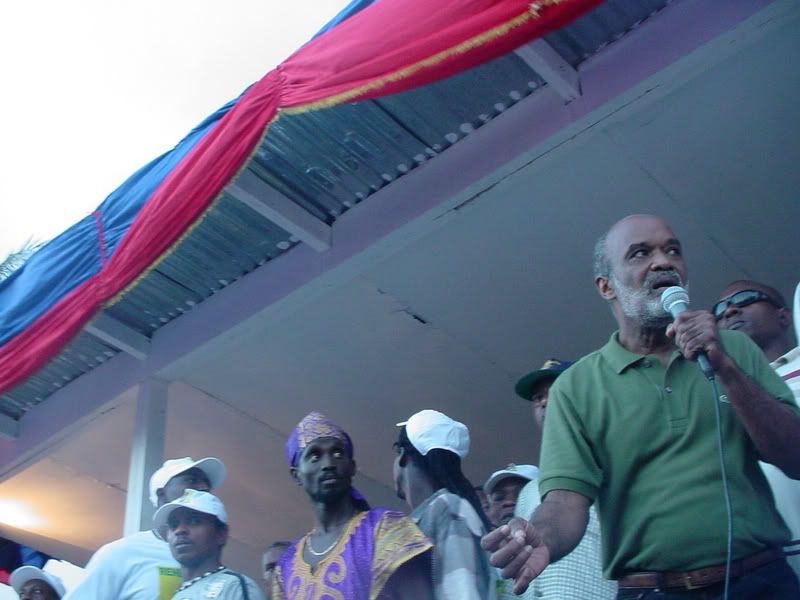
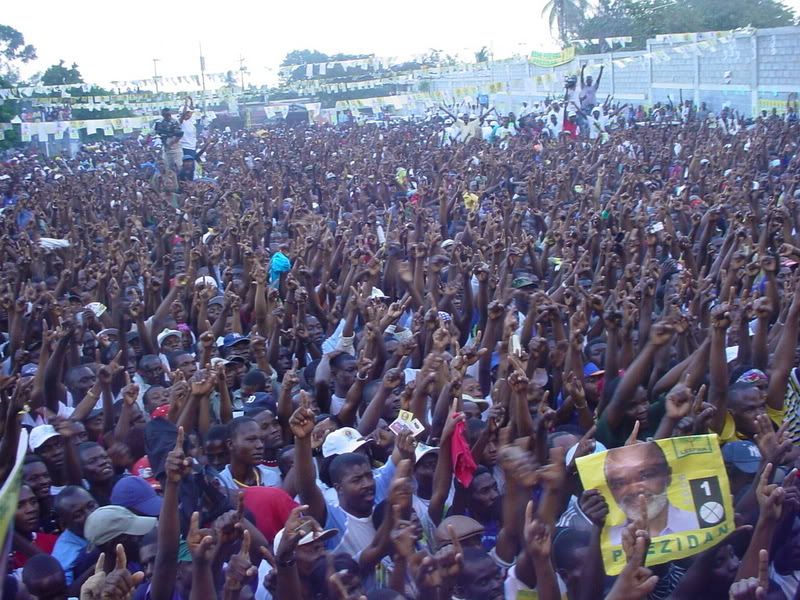
Thursday, August 31, 2006
Peer-reviewed Study in British medical journal The Lancet finds 8,000 Deaths in Port-au-Prince under Haitian Interim Government
Also another interesting piece came out today in the
Independent, discussing some of the tactics that the U.S. embassy in Managua has utilized towards manipulating Nicaragua's upcoming November 2006 presidential election.
Monday, August 28, 2006
Interview with Persecuted Cite Soleil Photojournalist Jean Ristil
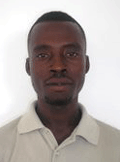
Jean Risitl, Photojournalist
Tortured and Arrested in 2005
Saturday, August 19, 2006
September Events in Cali
Viento-y-Agua. 4007 E. 4th Street, Long Beach, CA 90814. Bring a friend. We had a wonderful Haiti event in Los Angeles at the Golden State Mutual Building on June 22nd. Ginette Apollon of the Confederation des Travailleurs Haitiens (CTH), Haiti's largest trade union which came under persecution following February 2004, and Rea Dol the director of a school in Port-au-Prince spoke. See the photo below which only shows some of the crowd. The place was packed with over 150 in attendance. I will be speaking at Whittier University on November 8th at 7pm. More information to come.

Tuesday, August 8, 2006
Invisible Violence: Ignoring Murder in Post-Coup Haiti

Monday, July 17, 2006
Interview with Moise Jean Charles
Here is the short version of my interview in 2006 with Moise Jean Charles, published in Left Turn magazine, scanned up.
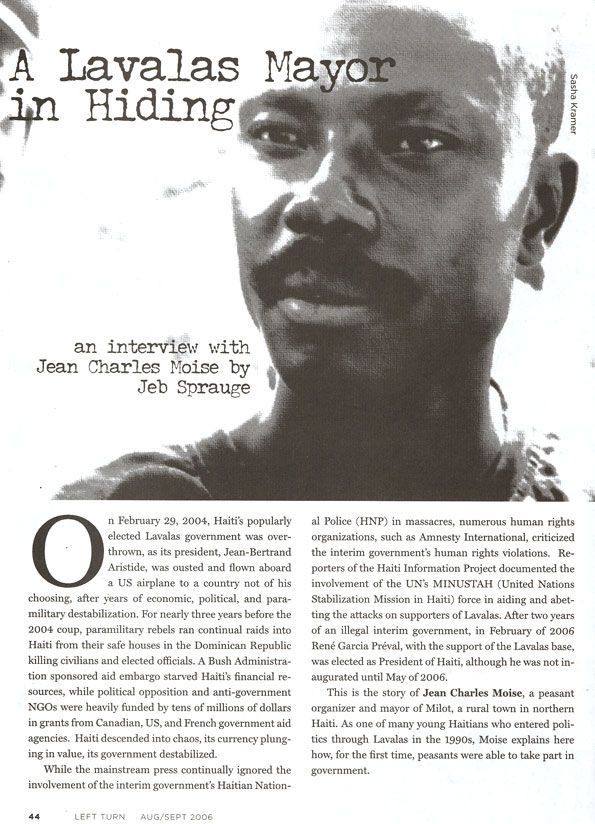
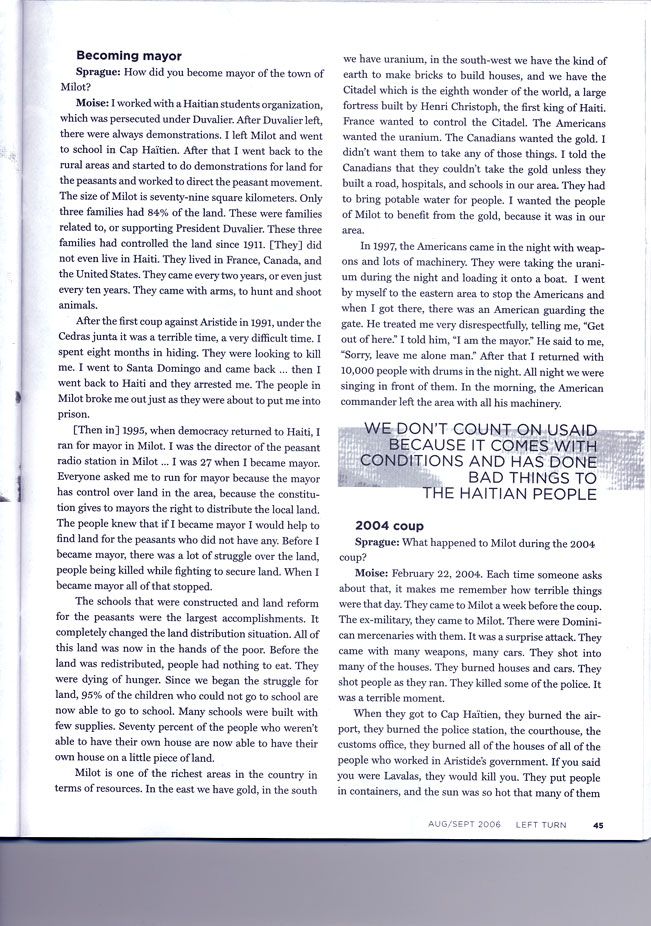
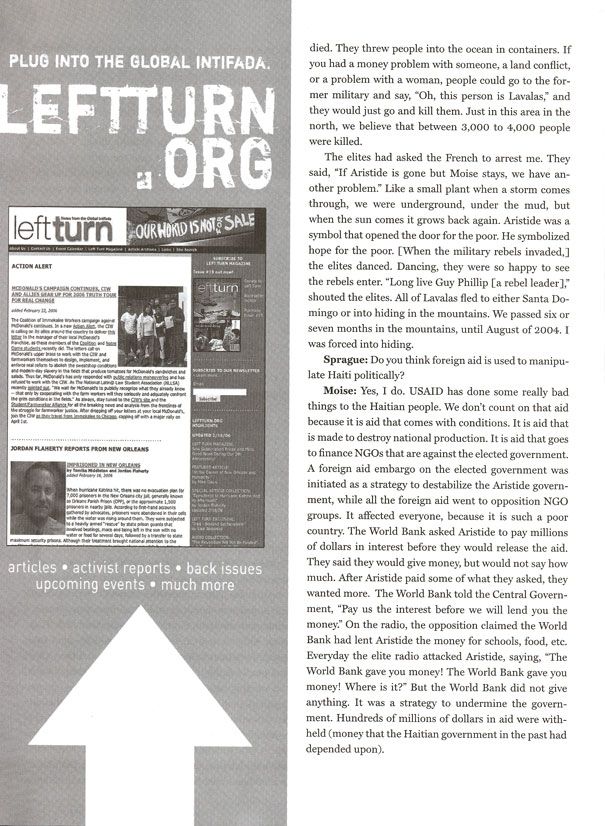
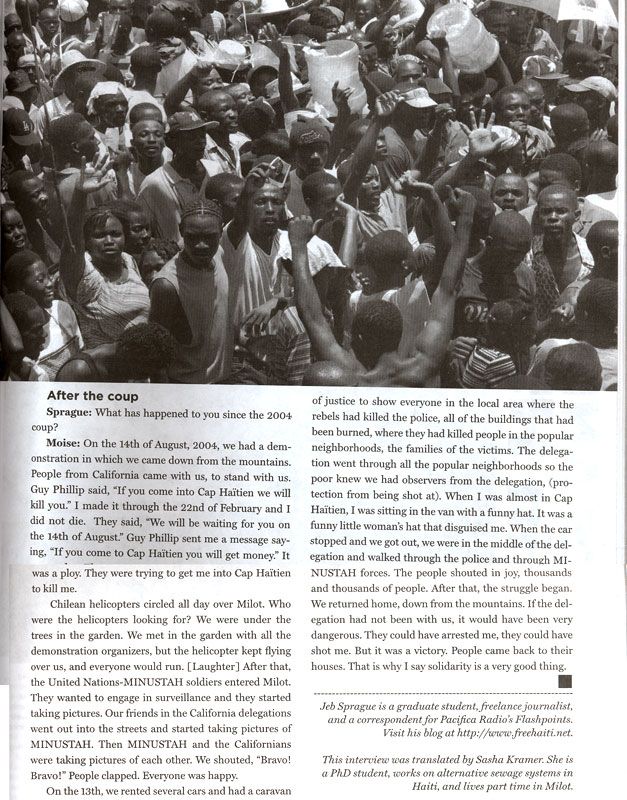
This article appeared in the July/August #21 Issue of Left Turn Magazine. You can order it from clamor (click the image).
 . Also within Issue #21 is an excellent piece on the recent Haitian elections by Photo-Journalist
. Also within Issue #21 is an excellent piece on the recent Haitian elections by Photo-Journalist Andrew Stern. An alternative version of this interview (with some different q&a's) will be up on the Left Turn Website sometime in the near future. You'll have to read both the online and hardcopy editions to see the interview in its entirety. Also check out WBAI's 7/1/06 show Haiti: The Struggle Continues for a new interview.
Monday, July 10, 2006
An Orphan of Gran Ravine: Widmise Jocelyn
Donations to support the work of AUMOHD in this baffling and shocking disaster can be sent to:
Tom Luce. Hurah, Inc. - Human Rights Accompaniment In Haiti
In Partnership with AUMOHD, a Haitian Human Rights Advocacy Group.
900 US Advocates
1515 Fairview St. Apt. 3

Thursday, July 6, 2006
IRI, World Bank, Emmanuel Constant...
History should also note that the Bolous-family-funded Haiti Democracy Project (HDP) recently had John Merrill, Chief of Western Hemisphere programs for the Department of Defense, as an "election observer" on its team. In an article for USA Today Danna Harman(2/8/06) failed to mention he was working for the Defense Department.
See
http://www.iri.org/05-23-06-IRIAnnouncesStaff.asp
In other news...

Just posted up on AP: "Death Squad Leader Emmanuel Constant Arrested in New York, July 5, 2006"
This undated photo of Emmanuel Constant was released by the Suffolk County Police Department in Riverhead, NY, Thursday, July 6, 2006. Constant, 48, a former strongman from Haiti and former employee of the CIA, accused in a federal lawsuit of sanctioning systematic rape to silence dissent, was arrested, Wednesday, July 5, in a mortgage fraud scheme on Long Island.
Here is an interesting bit about the World Bank
I am reading Susan George's "Faith and Credit" right now. Here is how she ends the book:
"The Church's traditional imagery of heaven and of hell is graphic and explicit. Although it cannot prove that anyone has ever gone there, it still issues the visas to the promised land. The [World] Bank paints no pictures with saints, angels and demons but it does put up signposts pointing towards paradise, exhorting the faithful to imitate the blessed - the now-developed rich market-economy countries or at least those who are well on their way, like the Asian tigers.
The very vagueness of the concept of development and the great number of candidates who hope to attain it legitimize the Bank's functions, justify its existence and explain its power. As long as the fragile planet's heavenward journey lasts, as long as the poor are with us, as long as salvation is sought where it cannot be found, the World Bank will find for itself a role and a mission." - Susan George and Fabrizio Sabelli, "Faith and Credit: The World Bank's Secular Empire" (1994)
Tuesday, June 13, 2006
Flashpoints Interview with Prof Kim Scipes
Thursday, June 8, 2006
Wednesday, May 17, 2006
Preval Inaugurated. A weakened democracy replaces foreign installed dictatorship. Energy accord signed with Venezuela.

Haiti's 56th President Rene Garcia Preval was sworn into office on May 14, 2006. Surrounded at the inauguration by elites and backers of the 2004 coup, Preval called for peace. Turning his back on the foreign installed President Boniface Alexandre, he refused to be handed the sash by the interim government, having instead an elected official from his Lespwa party place the sash around him. Outside of Haiti's national palace filled with security and foreign dignitaries, masses of Haitians chanted for Preval and the return of Arsitide. "Whether they like it or not, Aristide is returning," the protestors cried. According to the constitution Preval should have taken office 96 days ago. Haiti Progres writes that after giving his speech and snubbing Florida Governor Bush who sat nearby, Preval "..personally came to Venezuelan vice-president Rangel, who had been sitting one seat away from Jeb Bush, and led him away without even acknowledging Bush. The [Florida] governor, stone-faced, quickly left for the airport."
Preval is off to a quick start. Following the inauguration he immediately signed a Petrocaribe accord with Venezuela. Preval announced, ".. already 100,000 barrels of oil arrived in Port-au-Prince [this morning]. We know what kind of relations there have been between Haiti and Venezuela. In Jacmel, [Francisco de] Miranda created the Venezuelan flag and received aid from Haiti from President [Alexandre] Petion. And the alliance was so strong that today at the foot of the stairs to [Venezuela's] National Palace one finds two busts: one of Petion and the other of [Simon] Bolivar."
Rangel replied, "With this act, Venezuela pays an historic debt to Haiti. An eternal debt, which is also the root of liberty and the root of the Venezuelan nation. It is a debt not only
to President Petion but also to the thousands and thousands of Haitians who fought alongside Miranda for the liberty of not only Venezuela but of all Latin America."
Haiti has a daily fuel consumption of 11,000 barrels of fuel.
Venezuela will sends 7,000 barrels a day to Haiti under the PetroCaribe accord and an additional 4,000 barrels will be sent under the San Jose accord, a separate accord negotiated with Venezuelan President Hugo Chavez. Haiti will receive 100% of its fuel/gasoline from Venezuela.
In a recent talk on his weekly radio show "Hallo Presidente!", President Chavez of Venezuela stated, "We are going to include Haiti in Petrocaribe and send it all the fuel it needs. We are also building storage facilities with a special fund", he said, because many countries do not have places to store crude oil. These storage facilities that Chavez speaks of are just the sort of "tank farm" that Haiti could benefit from.
Thirteen countries in the Caribbean are importing Venezuelan oil and are getting an approximate 40 per cent discount off the international market price of oil. With this program beginning in Haiti, it should overtime allow for the new government to build up an oil reserve, slowing inflation, and eventually creating energy sovereignty.
Petrocaribe requires that Caribbean countries pay a portion of the cost of the oil up front but allows them to finance the remainder through low-interest loans over 25 years. The lack of fuel in Haiti has hammered the aging power grid- so this could provide some long term relief and help in constructing a long term energy plan for the deeply impoverished island-nation.
Wednesday, March 8, 2006
A Talk on the Labor Parallel in Haiti at the University of Californa, Los Angeles (UCLA)
Wednesday, February 15, 2006
Burned/Dumped Ballots in Haiti
AUMOHD writes, "Thanks to our volunteer accompanier, Jared Sibbitt, here are three of pics of the burned ballots. Our information is that these were found in an area called Marcial near Cite Soleil. I have placed more pics on our website since this listserve has some limits on size of messages."
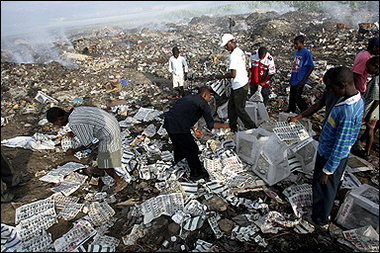
From AP: "We expected these MREs to do anything in their power to steal the elections and they did not disappoint us. Guy Delva of Reuters News Agency reported that hundreth and possibly and possibly thousands of burnt and still smoldering ballots, many cast a week ago for Preval, were found on a Port-au-Prince garbage dump, outraging Preval supporters and setting off demonstrations after nightfall. "Steve Jacobson of AP also reported Local Telemax TV news Tuesday night showed smashed white ballot boxes in a garbage dump, with wads of ballots strewn about. Ballot after ballot was marked for Preval."
Corbbet Lister Patrick Tortora writes, "On Haitian Television Channel 5 this evening a cameraman was following Haitians who were taking him through a rubbish dump near Citi Soleil. The people leading the cameraman around were showing hundreds if not thousands of presidential ballots that had been marked for a presidential candidate and signed on the reverse by an official of the Electoral Council. All the ballots that were shown to the camera were marked for Preval. There were also many cardboard ballot boxes littering the dump. The inference was that legally marked ballots were dumped in the landfill. Even if these ballots were counted before being discarded, what were they doing in the dump before all ballots were counted and before election result were announced, not to say anything about a possible recount?"
David Willmhurst, of MINUSTAH, says that it was possible someone dumped the ransacked ballots to create an appearance of fraud. Wimhurst also said there was no evidence of fraud. The U.N. provided security for the vote (much like they provided "security" for the Haitian National Police while they have massacred poor Haitians for the last two years) and helped ship election returns to the capital but is not directly involved in counting ballots. Coup President Boniface Alexandre's chief adviser Michael Brunache announced the votes will be reviewed by a commission which will include presidential candidate Rene Preval's attorneys.
AHP reports "Thousands of ballots were discovered this Tuesday in a huge garbage dump situated in the Thuittier district north of the capital (Port-au-Prince). The ballots bore check marks in box number one, which is the number representing the presidential candidate of the Espoir Platform (Platform of Hope), Rene Preval. All of these votes, many of which were found inside ballot boxes, appeared to have come from voting centers set up in the periphery of the shantytown of Cite Soleil, where more than 95% of the population voted for Espoir."
Monday, February 13, 2006
Children of Cite Soleil in the Pools of Hotel Montana - Protesting CEP
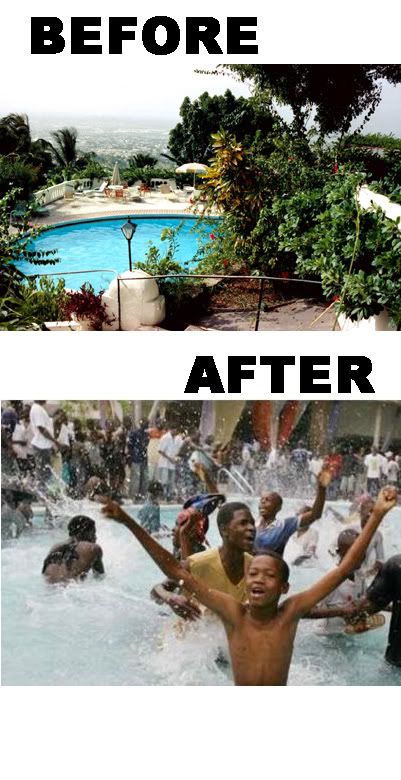
After officials within the CEP criticized other officials for vote tampering and one or possibly two demonstrators were killed (reportedly by Jordanian members of the UN MINUSTAH force), the Haitian masses from Bel Air, Cite Soleil, Delmas, and other neighborhoods have marched on Hotel Montana. As the crowd began to jump in the Hotel Montana's pool, the UN troops were landed by helicopter on the Hotel's roof. The Hotel Montana is the central point where the media, politicans, private military contractors (PMCs), foreign funded "democracy promootion" workers, elite, etc gather in Haiti's capitol.
Tuesday, February 7, 2006
Flashpoints Interview
Or see it up on Znet">
Sunday, February 5, 2006
Seeking an “Even Playing Field”: Washington and UN Work to Create Anti-Lavalas Coalitions
As Haiti’s legislative run-off elections approach, it is worthwhile to review elements of Washington’s campaign to rig the vote in favor of its local client parties. This “democracy promotion” – which is anything but that – is strategically critical to winning the Haitian parliament, with which President-elect René Préval will name the new prime minister, Haiti’s most powerful executive post. Researcher Jeb Sprague has published the findings that are the basis of this article on his weblog (www.freehaiti.net).
In the years leading up to Haiti’s 2006 presidential and legislative elections, whose second round are now set for April 21, the International Republican Insitute (IRI) helped form and coach three coalitions of right wing and social-democratic parties, which were all partisans of the Feb. 29, 2004 coup d’état against President Jean-Bertrand Aristide.
IRI’s goal was the “strengthening [of] democratic political parties,” according to an October 2004 IRI document I obtained through a recent Freedom of Information Act (FOIA) request. But in the past, as pointed out in Irwin Stotzky’s Silencing The Guns in Haiti, the IRI proposed “leadership training exclusively for non-Lavalas centrist political party representatives,” considering supporters of Lavalas as “undemocratic.” All of the client parties trained and facilitated by the IRI were arrayed against the FL in the Democratic Convergence political front, supporting the 2004 coup.
Nonetheless, IRI had a hand in merging a rump faction of former FL leaders into a coalition with the Movement for the Installation for Democracy in Haiti (MIDH) of Marc Bazin, whose ill-fated campaign as a supposed “Lavalas” presidential candidate netted him only 0.68% of the February 7 vote. According to interviews conducted by Canadian journalist Anthony Fenton, the IRI was involved in the meetings to merge the rump “Lavalas” and MIDH.
FOIA discoveries by researcher Jeremy Bigwood indicate that Marc Bazin was involved in meetings with IRI prior to the 2004 coup.
IRI is the Republican arm of the National Endowment for Democracy (NED), a quasi-official foundation which carries out Washington’s “democratization” programs in nations around the globe – working to promote candidates and parties that further U.S. strategic interests. IRI has worked continuously to undermine democracy in Haiti, as made clear in the January 28, 2006 New York Times article "Mixed U.S. Signals Helped Tilt Haiti Toward Chaos" (see Haïti Progrès, Vol. 23, No. 47, 2/1/2006). IRI’s Democratic Party counter-part at the NED is the National Democratic Institute (NDI). In addition to other funding, the IRI and NDI have a joint $5.7 million contract in Haiti for 2002-2006 with USAID.
Meanwhile, through another FOIA request, I have learned that the U.S. State Department’s Agency for International Development (USAID) recently funneled $3 million through the United Nations Office for Project Services (UNOPS) to provide “logistical support to democratic political parties during the 2005 electoral campaign.” According to the released USAID document, USAID and UNOPS “invited the democratic parties” – again no mention of who the “undemocratic” parties are – “to attend an information meeting on Friday, November 4 [2005].” At that meeting the parties were asked to “sign memoranda of understanding” that would allow them to use SUVs and minivans “for outreach and election-monitoring activities in outlying cities.” The USAID money also went to “purchasing media time for campaign messages” and the providing “shirts, posters, campaign materials, etc.” as well as the all important “operational expenses for political party representatives” monitoring the elections. All this for “democratic parties” who came to an “understanding” with USAID and UNOPS. USAID’s Haiti Country Team selected the “democratic and law-abiding political parties and coalitions... in consultation with” IRI and NDI. According to the document, the $3 million was to be disbursed from August 22 through December 31, 2005 “with possibility for extension... due to election delays.”
Reportedly, René Préval's Lespwa party refused the UNOPS/USAID funding.
Meanwhile, leaders of the Lavalas Family party were jailed or exiled by the de facto government. With millions going to help rival political parties in Haiti, it is no wonder that USAID says that its UNOPS project would help "even the playing field for the upcoming elections."
It is also interesting the importance that USAID gave to helping create a “socialist” coalition between the Struggling Peoples Organization (OPL) of Paul Denis, the National Progressive Revolutionary Haitian Party (PANPRA) of Serges Gilles, the National Congress of Democratic Movements (KONAKOM) of Victor Benoit and Micha Gaillard, and Ayiti Kapab.
I believe that the IRI is working to neutralize and destroy the parties championing Haiti’s Lavalas ideals by strengthening and constructing rival parties and coalitions. Is this democracy when neo-conservative political operatives, funded by the world's foremost superpower, work to undermine the political process of the Western Hemisphere’s poorest country?
The OPL's Paul Denis surely suspected that his IRI and USAID support was not going to put him in the lead. Just before the election, he “denounced what he termed the lack of determination by the Provisional Electoral Council to make corrections to the electoral process before February 7, 2006, the date of the first round of the presidential and legislative elections,” the Haitian Press Agency (AHP) reported. “The OPL provided an upbeat assessment of [Denis’s] electoral campaign and considered that the failure to regularize the situation will result in a low voter turnout, which could in turn lead to doubts about the legitimacy of the results of the election and a new confrontation in Haiti. Mr. Denis said he feels assured of victory, but he regrets that his advice was not taken into account by the actors involved in the electoral process.”
Here is an extract from the IRI documents my FOIA request released: "Since 2002, IRI has formulated seminars, targeted at women and youth from political parties and civil society, on campaign management, political party structure, fundraising, polling, political communication, platform development and the uses of Internet Technology to strengthen political parties. . . Throughout the year [2004], IRI helped with the ongoing emergence of three major coalitions and one merger of left of center parties. The coalitons are: the Grand Front Centre Droit (GFCD), Union Patriotique, and Fronciph. . . From July 31 to August 1, 2004, leaders of left of center parties, Ayiti Kapab, KONAKOM, OPL, and PANPRA met to discuss ways to accelerate a merge and the various techniques needed to advance the goal at the municipal level. At the end of the session, they put in place a work plan for the departments and municipalities to implement the merger of the four parties, now called the Groupe Socialiste. . . IRI is still working with the Christian democratic parties for a similar coalition. . . IRI's information technology trainings have helped political parties create their own websites:. . . OPL. . . GFCD. . . MDN. . . Generation 2004."
The Haiti Democracy Project, an elite-funded think-tank, has put on its website an interview between pro-coup journalist Nancy Roc and Paul Denis. In the interview, Denis discusses the OPL's role in Democratic Convergence’s campaign against Haiti’s democratically elected government: "We had a Convergence which gathered parties from the left and the right, but we were joined together around the same objective: the fight against Aristide and for his departure."
This is the kind of “democratic and law-abiding” party that IRI and USAID are spending millions to support.
USAID FOIAs on IRI and UNOPS
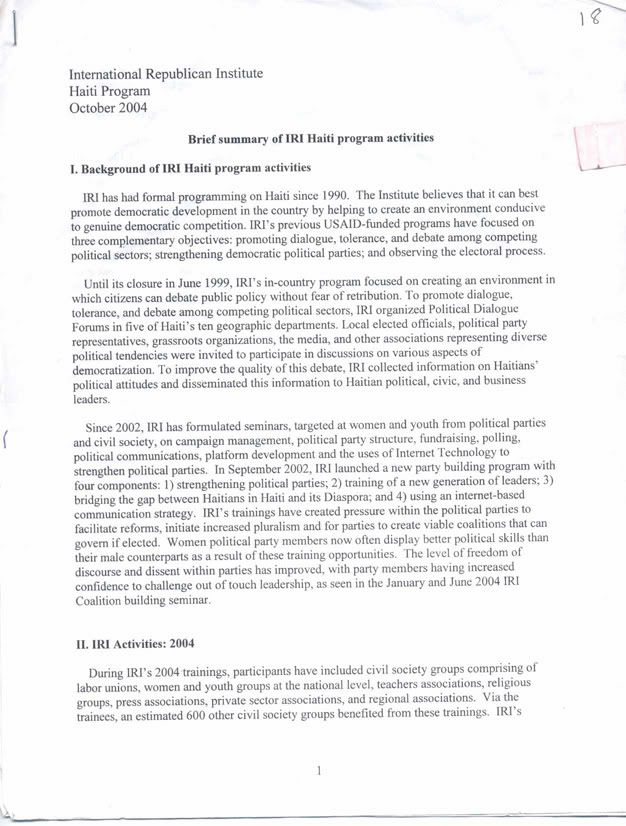
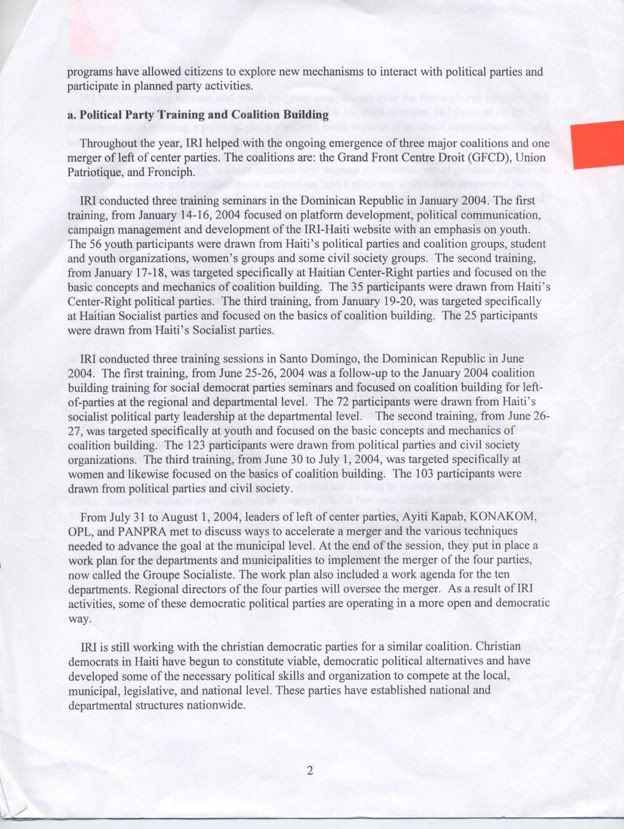
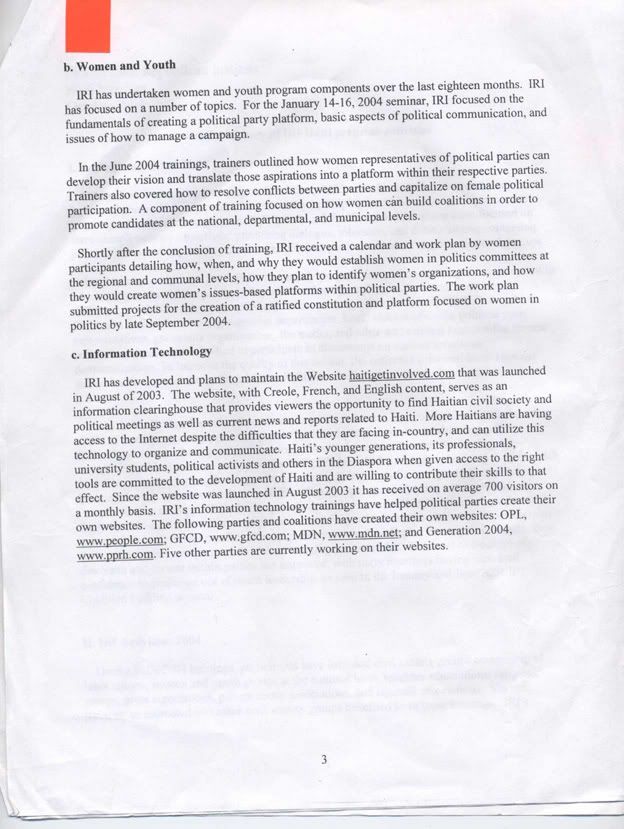
USAID FOIA on UNOPS

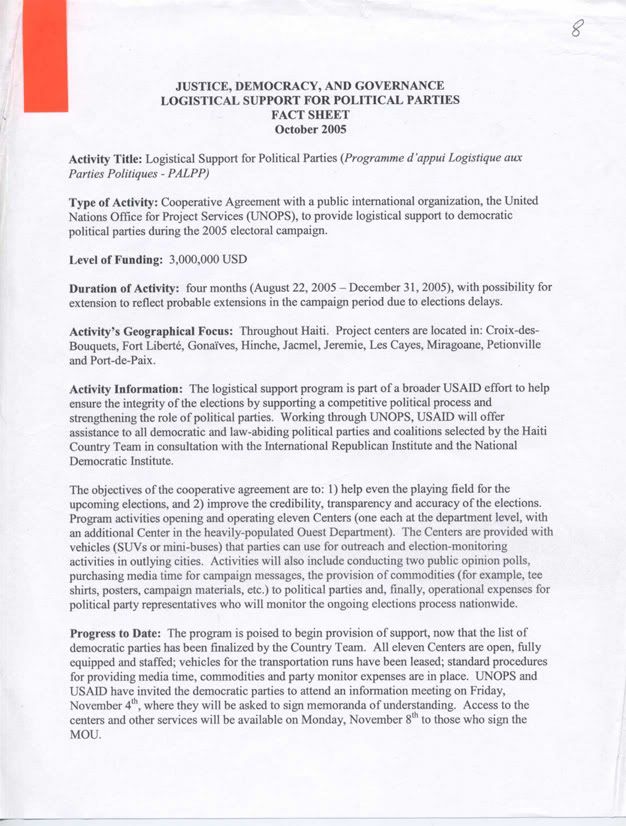
Saturday, February 4, 2006
Freedom for Father Gerard Jean-Juste
Thursday, January 26, 2006
WSF in Caracas
Also courtesy of Anthony Fenton/INADEM see Narco News for info on new NED grants and some good links.
